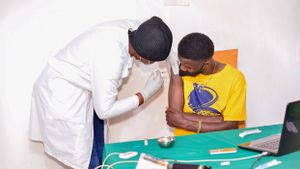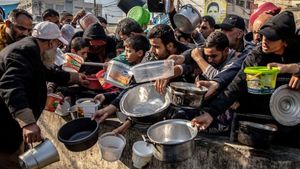JAKARTA - The government has followed up a number of steps to prevent the entry of a new variant of COVID-19, namely B.1.1529 or Omicron, into the country. One of them is by preventing travelers from a number of countries in Africa and Hong Kong.
Coordinating Minister for Maritime Affairs and Investment (Menko Marves) Luhut Binsar Pandjaitan announced that he had officially banned foreign nationals (WNA) from a number of countries in Africa and Hong Kong from entering Indonesia. This ban officially goes into effect today or Monday, November 29.
"Entrance ban for foreigners who have a history of travel during the last 14 days to the following countries: South Africa, Botswana, Namibia, Zimbabwe, Lesotho, Mozambique, Eswatini, Malawi, Angola, Zambia, and Hong Kong," Luhut said in an online press conference broadcast, Sunday, November 28.
The number of these countries, he continued, could be reduced or increased. The reason is that the government will continue to conduct periodic evaluations.
In an effort to prevent the spread of this new variant, the government has also established a new quarantine policy. For Indonesian citizens who return to the country and have a travel history from 11 countries, they will be quarantined for 14 days.
Meanwhile, foreign nationals who come to Indonesia other than these dozen countries, must quarantine for 7 days or four more days from the previous policy.
In addition, the government through the Ministry of Health will also improve genomic sequencing for international travelers. "Especially from positive cases from a history of traveling abroad to detect this Omicron variant," said Luhut.
SEE ALSO:
Why does Omicron need to be anticipated by the government?
Although still being researched by virologists around the world, this Omicron variant of COVID-19 must still be watched out for. Health Minister Budi Gunadi Sadikin said there were at least three risk groups that were currently being investigated.
The first group is increasing in severity which until now has not been proven by someone who is infected. Then, lowering antibodies from immunity after a person is vaccinated and exposed to COVID-19.
"There are 3 groups of danger, increasing severity, increasing transmission, decreasing the ability of antibodies from infection, and vaccination. The first has not been confirmed, the second and third most likely yes. But again it has not been confirmed because it is being studied by experts," said Budi in the same press conference.
He then explained that currently there are 9 countries that have positive cases of the Omicron variant as of November 28. The country with the most transmission of this new variant is South Africa with 99 cases.
Furthermore, cases have also been detected in Botswana, England, Hong Kong, Australia, Italy, Israel, Belgium, and the Czech Republic. Then, Budi said there are 4 countries that are likely to be detected by Omicron or probable, namely the Netherlands, Germany, Denmark, and Austria.
"So the positive confirmation cases (Omicron variant) are in 9 countries. Probable cases or there may still be in 4 countries. So we also don't need to panic and rush, and take a non-database policy," he said.
Omicron is in the high alert category
The spread of this variant was then responded to by the World Health Organization (WHO). University of Indonesia health expert Tjandra Yoga Aditama said the organization entered the category of highest vigilance or variant of concern (VOC) after observing.
"WHO has classified it in the VOC based on the recommendations of the WHO's Technical Advisory Group on SARS-CoV-2 Virus Evolution (TAG-VE)," he said as quoted by Antara.
The former Director of Infectious Diseases of WHO Southeast Asia said the variant has characteristics of being more easily transmitted, causing more severe disease, significantly reducing neutralization by antibodies, can reduce the effectiveness of treatment, vaccines, or medical diagnosis.
"The main consideration is because of the many mutations that occur, some say 30 in the spike protein and some say up to 50 total mutations," he said.
With this condition, Tjandra said Omicron became the virus variant with the most mutations during the COVID-19 pandemic and some of these mutations were new types that were feared to trigger the rapid spread of cases.
"In recent weeks the number of cases has risen sharply in almost all South African provinces. Previously, in Europe, it was only found in Belgium, since yesterday there have been three other countries, Germany, Britain, and Italy, apart from Israel and Hong Kong, so that they have crossed continents," he said.
"WHO is very quick to classify Omicron in VOCs. So the distance between viruses found and declared as VOCs is only 17 days," concluded Tjandra.
The English, Chinese, Japanese, Arabic, and French versions are automatically generated by the AI. So there may still be inaccuracies in translating, please always see Indonesian as our main language. (system supported by DigitalSiber.id)


















